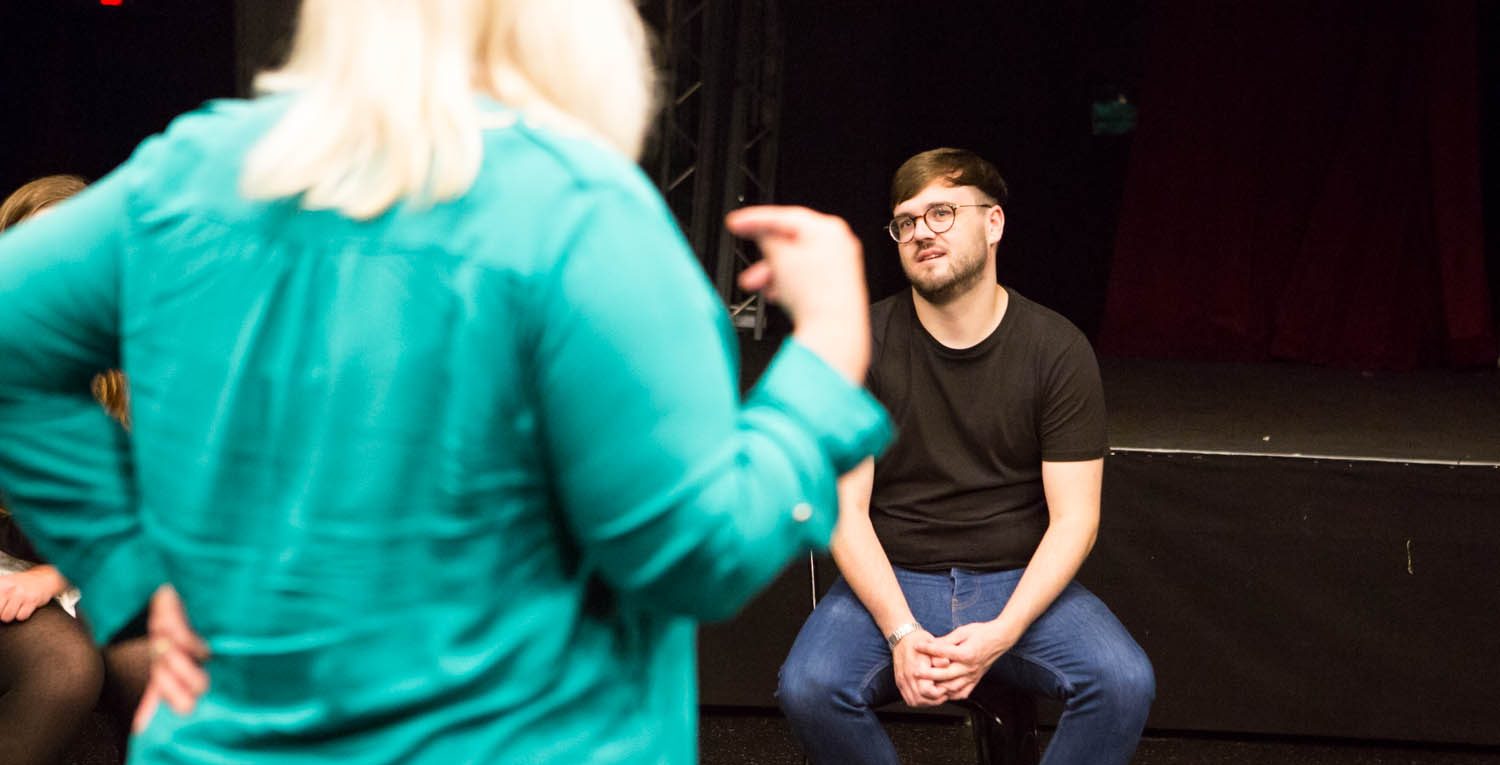Improv acting, or improvisational theater, is a unique form of acting that involves creating scenes and dialogue spontaneously, without a script. Unlike traditional acting, where every word is carefully scripted and rehearsed, improv actors rely on their creativity, quick thinking, and ability to collaborate with others in real-time to build scenes from nothing.
Why should someone consider becoming an improv actor? The answer lies in the versatility and skillset that improv offers. Whether you’re looking to break into the entertainment industry or just want to improve your communication skills, the benefits of improv extend far beyond the stage. It’s a way to develop sharper creativity, build confidence, and master the art of thinking on your feet.

Improv acting offers a wide array of benefits, not only for those aiming for a career in entertainment but also for people from all walks of life. The skills developed in improv can be applied to almost any profession or social setting, making it a valuable pursuit for anyone looking to improve their communication, creativity, or ability to work under pressure.
Benefits for Aspiring Actors and Comedians
For aspiring actors and comedians, improv is one of the best training grounds. It sharpens essential performance skills while giving you the flexibility to take risks and experiment in ways that traditional acting classes might not allow.
- Quick Thinking: Improv teaches you how to think on your feet. In a scripted performance, you have time to rehearse and perfect your delivery. In improv, you must react in real-time, honing your ability to make fast, confident decisions.
- Character Development: Without the luxury of a script, improv actors develop a keen sense for creating characters on the spot. This skill transfers well to other forms of acting, where depth of character is critical.
- Versatility: Many successful actors, including Tina Fey, Steve Carell, and Amy Poehler, started their careers in improv. The ability to improvise can make you more adaptable in auditions, rehearsals, and on set.
- Comedy Training: If you’re interested in comedy, improv is the perfect training ground. It teaches comedic timing, how to build a punchline from nothing, and how to find humor in the most unexpected situations.
Skills You Can Develop Through Improv
Whether you’re looking to improve your acting chops or just gain confidence in everyday life, improv helps develop a unique set of skills:
- Adaptability: Since nothing in improv is planned, you must adapt quickly to new information and changing situations. This skill is valuable not only on stage but also in high-pressure work environments or personal relationships.
- Spontaneity: Improv encourages you to follow your instincts. Learning to trust your first reaction, rather than overthinking or second-guessing yourself, can lead to more authentic and engaging performances—or conversations.
- Collaboration: Improv is a team effort. You’re constantly working with others to build a scene, solve problems, and create something new. This fosters a strong sense of teamwork and communication.
- Public Speaking: If you struggle with public speaking, improv can be a powerful tool. It teaches you to be present, articulate under pressure, and engage with your audience—all key components of successful public speaking.
Real-Life Applications of Improv
Improv isn’t just for actors and comedians. The skills it cultivates are useful in a variety of real-life situations. Many businesses use improv workshops as part of their employee training to improve communication, creativity, and collaboration.
- Problem Solving: Improv helps individuals think creatively and approach problems from different angles. By encouraging spontaneity and flexibility, it fosters a mindset that welcomes new ideas and solutions.
- Negotiation: In a negotiation setting, being able to listen actively, respond quickly, and adapt to the other party’s needs is essential. These are all skills honed in improv.
- Public Relations and Marketing: Working in public-facing roles often requires you to think on your feet and deliver responses that are both thoughtful and timely. Improv helps professionals in these fields build confidence and stay calm under pressure.
Improv as a Tool for Personal Growth
On a personal level, improv can be incredibly rewarding. Many people use it as a form of self-improvement or therapy, as it encourages personal expression and builds self-confidence. Being put in situations where you must act quickly and without judgment can break down mental barriers, making you more comfortable with uncertainty and more confident in your ability to handle whatever life throws at you.
Case Study: Improvisation and Business Leadership
- A Harvard Business Review article explored how improv techniques are being used in leadership training for executives. The ability to stay agile, make decisions quickly, and adapt to unforeseen circumstances—skills sharpened by improv—are directly applicable to leadership roles in modern business.

How To Start Your Journey to Becoming an Improv Actor
Starting your journey to becoming an improv actor can seem daunting at first, but like any skill, it is something that can be learned and developed with practice. While natural charisma and quick wit can be helpful, the key to becoming a successful improv actor is understanding the fundamentals, participating in classes, and putting in the practice necessary to improve your skills over time.
Step 1: Understand the Fundamentals of Improv
Before diving into performance, it’s crucial to grasp the foundational principles that make improv successful. These fundamentals are the building blocks of every scene, and mastering them will help you grow quickly as an improv performer.
- Yes, and…
This is the cardinal rule of improv. The idea is simple: when your scene partner presents an idea or a scenario, you accept it (the “Yes”) and then add something new (the “and”). This agreement propels the scene forward and encourages creativity. Example: If someone says, “Look, it’s starting to rain,” you wouldn’t reply with, “No, it’s not,” because that blocks the progression of the scene. Instead, you might say, “Yes, and we forgot our umbrellas, so let’s make a run for it!” - Listening
Active listening is an essential skill in improv. Since nothing is scripted, you need to pay close attention to your scene partners to respond appropriately. Missed details can derail the flow of the scene, so being present and attentive is vital. - Spontaneity
Improv is about staying in the moment and reacting honestly to what is happening. Overthinking can be an improv killer. The best improvisers don’t plan their responses in advance; they react based on what they hear and feel in the moment. - Trust
Improv is a collaborative art form, and trust is the foundation of good teamwork. You need to trust that your scene partners will support your ideas, and they need to trust that you’ll do the same for them. When there’s mutual trust, performers can take risks and push boundaries, knowing that the group will carry the scene together. - Commitment
Whatever character or situation you find yourself in, commit fully to it. Even if it feels ridiculous, the audience will follow along if you believe in what you’re doing. Half-hearted performances can fall flat, but full commitment makes the scene believable and engaging.
Step 2: Join a Local Improv Class or Workshop
Once you’ve familiarized yourself with the core concepts, it’s time to seek out formal instruction. There are many avenues for learning improv, and the best way to immerse yourself in the craft is by taking a class or workshop.
- Finding Classes Near You
Most cities have improv theaters or community centers that offer classes for beginners. A quick online search for “improv classes near me” or checking out local comedy theaters like the Upright Citizens Brigade (UCB) or The Second City will help you locate nearby opportunities. Many local theaters have regular workshops, ranging from beginner to advanced levels. - Online Improv Classes
If you live in an area where in-person classes are limited or not feasible, consider signing up for online improv classes. Platforms like Udemy, Skillshare, and specialized improv schools offer virtual workshops where you can learn the basics and interact with fellow students. - Choosing the Right Class
When picking a class, start with a beginner or introductory level unless you already have acting experience. These classes will cover the basic techniques and help you get comfortable with performing in front of others. As you progress, you can move into intermediate and advanced levels that introduce more complex exercises, scene work, and even long-form improv formats.
Step 3: Practice, Practice, Practice
Like any other craft, the more you practice improv, the better you will become. Regular practice is key to internalizing the concepts and feeling more confident on stage. Here are some practical ways to integrate practice into your routine:
- Practice with a Group
Improv is inherently a collaborative art form, so practicing with others is crucial. Join an improv troupe, participate in local meetups, or organize practice sessions with friends who are also interested in improv. Practicing scenes and exercises together will help you get comfortable with the back-and-forth exchange that makes improv work. - Solo Improv Exercises
While improv is often done in groups, there are ways to practice on your own as well. Try some of the following exercises:- Word Association: Start with a random word and then say whatever comes to mind next. The goal is to build fluency in thinking quickly and associating ideas.
- Character Work: Create characters based on everyday people you encounter. You can develop these characters by focusing on their quirks, behaviors, and physicality, practicing how to portray them in a scene.
- Scene Prompts: Give yourself random scenarios or prompts and practice creating a scene or monologue on the fly. This will help develop your spontaneity and quick thinking.
- Recording Yourself
One helpful technique is to record your improv practice sessions. Watching your performance afterward allows you to identify areas for improvement, such as body language, timing, or character development.
Step 4: Perform in Front of an Audience
Eventually, the goal is to take what you’ve learned and apply it in front of a live audience. Performing in front of others is where improv truly comes to life, and the feedback you receive will be invaluable for your growth as a performer.
- Overcoming Stage Fright
For many beginners, the thought of performing without a script can be intimidating. However, improv classes often provide supportive environments, allowing you to practice in a low-pressure setting before moving to larger stages. Start small by participating in class showcases, open mics, or local performances to build confidence. - Finding Performance Opportunities
Local improv theaters often host shows where students or community members can perform. Many cities also have improv clubs or informal groups that organize regular improv jams. These events give you a chance to perform in front of an audience while honing your skills. - Learning From Each Performance
Each time you perform, whether in front of classmates or a live audience, take it as an opportunity to learn. After a performance, reflect on what worked, what didn’t, and what could be improved. Ask for feedback from your peers or instructors, as they can offer insights that you might not have noticed.
These steps will set you on the path to becoming an improv actor, from understanding the core principles to performing on stage. Remember, improv is an ongoing learning process, so be patient and open to growth.